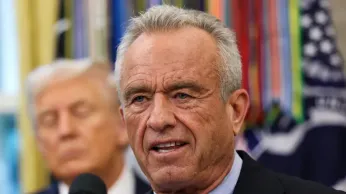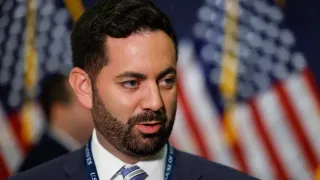
Oct 10
Health Secretary RFK Jr. Claims Circumcision Linked to Autism Through Tylenol Use
READ TIME: 5 MIN.
Health and Human Services Secretary Robert F. Kennedy Jr. made controversial claims during a White House Cabinet meeting on Thursday, October 9, 2025, asserting that infant circumcision is linked to autism through the use of Tylenol as a post-procedure painkiller. The statement adds to Kennedy's ongoing promotion of unproven theories connecting various medical interventions to autism spectrum disorder.
Speaking alongside President Donald Trump and other Cabinet members, Kennedy stated that "children who are circumcised early have double the rate of autism" and suggested this was "highly likely because they're given Tylenol." Kennedy characterized his assertions as evidence rather than medical proof, telling the assembled officials, "It is not proof. We're doing the studies to make the proof."
During the same meeting, Kennedy also reasserted his long-held belief in a connection between Tylenol use during pregnancy and autism, warning that "anybody who takes the stuff during pregnancy unless they have to is irresponsible." He referenced seeing a TikTok video that day featuring a pregnant woman taking Tylenol while criticizing Trump, which he described as evidence of "Trump derangement syndrome" that had "left the political landscape and now in the realm of pathology."
Kennedy also made an anatomical error during his remarks, stating that the woman in the video was taking Tylenol "with a baby in her placenta." In actuality, a fetus develops in the uterus, not the placenta, which is a temporary organ that provides oxygen, nutrients, and hormones to the developing fetus during pregnancy.
President Trump appeared to support Kennedy's claims during the meeting, stating, "There is some very strong evidence on Tylenol," and noting that he had discussed similar theories with Kennedy two decades earlier when Trump was still a real estate developer. Trump added that "the company gave a warning" about Tylenol use and that manufacturers "still don't recommend it during pregnancy."
Kennedy's claim about circumcision and autism appears to reference a 2015 study published in the Journal of the Royal Society of Medicine, which examined ritual circumcision and autism spectrum disorder risk in boys under age 10 in Denmark. The study found that boys who had undergone the procedure were more likely to develop autism than other boys in the study population.
However, the researchers who conducted the study explicitly noted significant limitations in their work. They suggested that any potential link might be due to the pain of the procedure itself, but crucially, they stated that they had no data on painkillers or anesthetics used during or after circumcision. This means the study could not address whether Tylenol or any other specific medication was linked to autism.
Medical experts reviewing the Danish study have pointed out that it examined correlation, not causation, meaning it identified a statistical association but did not prove that circumcision causes autism. Other researchers have cited additional studies that found no evidence supporting a link between circumcision and autism spectrum disorder.
Robert F. Kennedy Jr. has long promoted unconventional beliefs about public health, which have prompted concern among medical experts about his role as Health and Human Services Secretary. His appointment to the position has raised questions about whether he might upend evidence-based health policies in favor of theories that lack scientific consensus.
Kennedy's Thursday statement came approximately two weeks after he stood with President Trump in the White House as Trump used his office to promote unproven and, in some cases, discredited connections between Tylenol, vaccines, and autism. This pattern of promoting scientifically unsupported theories from positions of governmental authority has alarmed public health professionals.
The claims about circumcision and autism carry particular significance for LGBTQ+ communities and families. Many LGBTQ+ parents, including same-sex couples and transgender individuals who have children, must navigate complex medical decisions for their children based on reliable medical guidance. When government health officials promote theories that contradict scientific consensus, it can create confusion and anxiety for parents trying to make informed healthcare decisions.
Additionally, the intersection of medical misinformation with Kennedy's suggestion that opposition to his theories stems from "Trump derangement syndrome" creates a concerning political dimension to what should be evidence-based medical guidance. This politicization of healthcare information can particularly impact LGBTQ+ individuals and families, who already face disparities in healthcare access and quality.
The broader context of Kennedy's statements also raises questions about the administration's approach to public health policy and whether political considerations might override scientific evidence in healthcare decision-making that affects all Americans, including LGBTQ+ communities.
While no formal statements from major medical organizations specifically responding to Kennedy's October 9 remarks were available in the immediate aftermath, the medical community has previously expressed concern about Kennedy's promotion of health theories that lack scientific support. Public health experts have consistently emphasized the importance of basing health policy on rigorous scientific evidence rather than unproven theories or correlational studies.
The promotion of unsubstantiated health claims by high-ranking government officials poses challenges for healthcare providers who must address patient concerns based on incomplete or misleading information they may have encountered. This is particularly true for sensitive topics like autism spectrum disorder, where families often seek clear, evidence-based guidance about risk factors and prevention.
Autism spectrum disorder is a complex developmental condition with no single known cause. Current scientific understanding recognizes that autism likely results from a combination of genetic and environmental factors, though research into specific causes and risk factors continues. Major medical organizations and research institutions emphasize that vaccines do not cause autism, a conclusion reached after extensive research examining potential connections.
The promotion of unproven theories about autism causes can divert attention and resources from evidence-based research and support services for autistic individuals and their families. It can also contribute to stigma and misunderstanding about autism spectrum disorder.
Kennedy's position as Health and Human Services Secretary gives him significant influence over federal health policy, research funding priorities, and public health messaging. His promotion of theories that contradict scientific consensus raises questions about how the department will approach evidence evaluation, research prioritization, and public health communication during his tenure.
For LGBTQ+ individuals and families, who often rely on federal health agencies for guidance on inclusive, affirming healthcare practices, the direction of HHS leadership has particular importance. The department oversees numerous programs and initiatives that impact LGBTQ+ health, including HIV/AIDS research and prevention, mental health services, and healthcare nondiscrimination protections.
As Kennedy indicated during the Cabinet meeting that his department plans to conduct studies to "make the proof" for his theories about Tylenol and autism, questions remain about how such research would be designed, conducted, and evaluated. The scientific community typically requires rigorous peer review and replication of findings before accepting causal relationships, particularly for complex conditions like autism spectrum disorder.
The October 9 Cabinet meeting represents another instance of high-level government officials using their platforms to promote health theories that lack scientific consensus, raising ongoing concerns about the intersection of politics and evidence-based medicine in the current administration.






